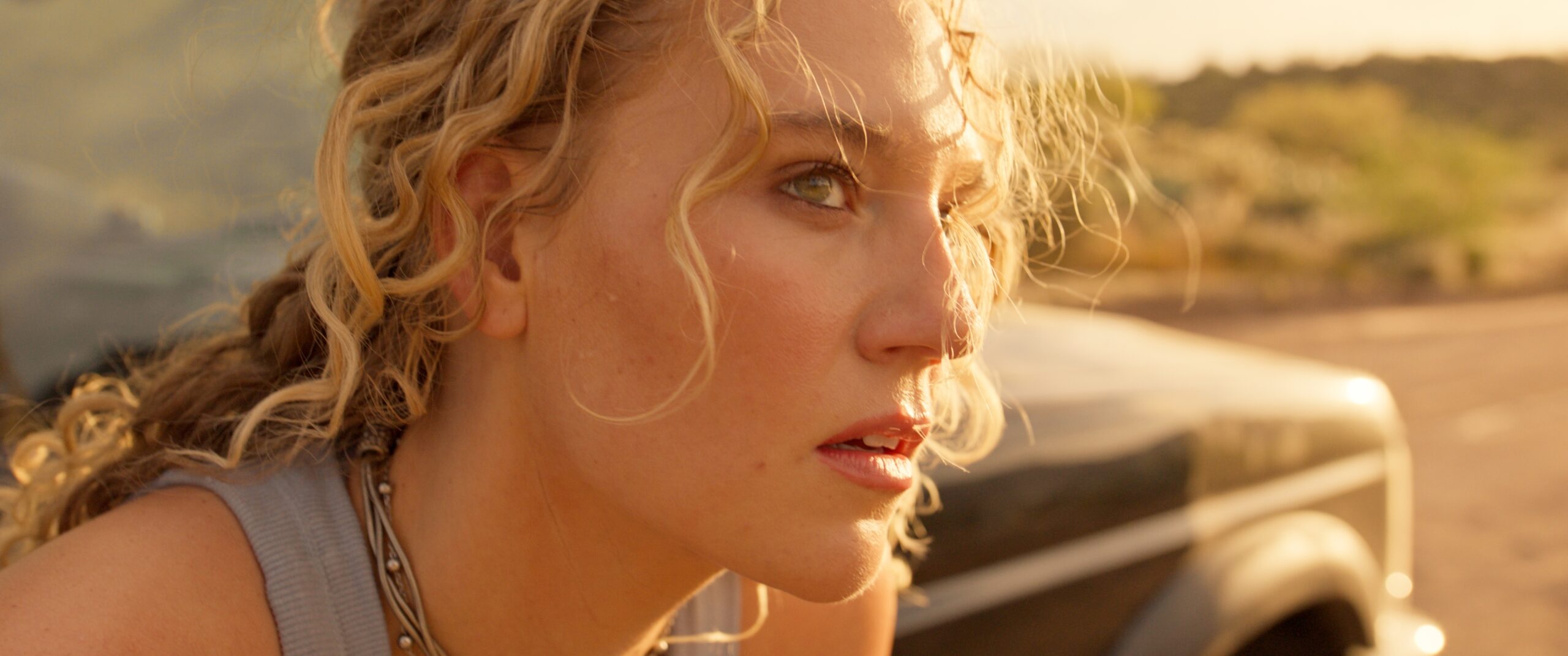
With 55 years in the business and 23 films to his name, David Cronenberg has made an indelible mark on the face of cinema. Not only is it impossible to imagine horror as a genre without him, his far-ranging interests, tenacity as an independent filmmaker and unmistakable sense of humour have solidified him not only a favourite among critics, but audiences and fellow filmmakers as well. His latest film, The Shrouds, is his most personal to date, inspired by Cronenberg’s own process of mourning after the death of his wife. To celebrate the film finally reaching UK audiences via Vertigo Releasing, we hopped on a call with one of Canada’s most beloved exports for a chat.
Get more Little White Lies
LWLies: I was in Cannes last year when [The Shrouds] premiered, and it was a real delight to be there. I feel like seeing a Cronenberg at Cannes is kind of the peak for me, as a Cronenberg fan.
Cronenberg: Hey, it is for me too.
I always love the names that you give your characters. There have been some real classics over the years. We had Saul Tenser in Crimes of the Future, we had Bianca O’Blivion in Videodrome, and now Karsh Relic. I would love to know where you find inspiration for your names, and do you keep a list every time you hear a name that you find interesting?
I do. I often do. I’m struck by a name, and I will make a note of it. I have a little file for names, and then I put a little note, if it’s a real person whose name it is, or whether it’s a compound name. Maybe I like Karsh for the first name, and Relic for the second name, and they come from two different notes that I made. It’s really just a matter of texture. It’s not significant, symbolically, let’s say. I mean, Karsh Relic obviously is not a Western, Anglo-Saxon type name, and that’s meant to indicate that his genealogy comes from someplace else, which he mentions in the movie at the beginning. It just adds something. If the character doesn’t have the right name, it feels to me like it won’t work.
It’s funny, because with Stephen King, once I had read ‘The Dead Zone’, and the lead character’s name is Johnny Smith — that’s a very extremely common sort of cliched name — and I said to a journalist, “I would never do a movie where there was a character named Johnny Smith.” Then, of course, I ended up adapting ‘The Dead Zone’, and I didn’t want to change the name because it was Stephen King’s name for his character. So yes, I have made a movie with a character named Johnny Smith.
It particularly strikes me in Crash, there’s some great names as well, so it feels like you and Ballard were on a kind of same wavelength with great names for characters.
Yeah, it took me a while to realize that Ballard and I were on the same wavelength, because I didn’t have a very good reaction to ‘Crash’ when I first read it. But then, a year later, I realized that I did get it, and I did like it, and wanted to make the movie. One of the things was, it was Ballard’s dialogue that first really attracted me. It was quite unique and tough and simple and disturbing. And then, of course, his imagery. So I realized eventually that there were a lot of things that he and I had in common, even though we came from very different places. And so it came together in the kind of fusing of our blood in the movie, which he did like a lot and supported it when we were being criticized by everybody in the world.
I was going to mention this later, but I think the fact that something like Crash was so reviled when it came out – and people were really quite vehement – and now the kind of things that get passed are so far beyond what is in Crash. I’m 32, and there’s a lot of people younger than me that are massive fans of your work. I’m curious to know if you found that younger audiences through the years have been more receptive to the ideas that are in your films.
Well, I think Crash is a good example, because when we showed it at Venice many years later, it was just a couple of years ago, because there was a new 4K version of it, and we screened it at Venice, and the audience there was very young. And they were totally not shocked and not outraged and not mad at me. And they all stayed for Q&A, and they were very welcoming and totally seemed to get the movie perfectly. Times do change, and reactions to art traditionally. I mean, Shakespeare was not well thought of in the Victorian era, and now he is a god. So if you live long enough, you will see some reversals in terms of the way your work is received.
And it can go the other way; it could be considered great and powerful, and then later considered inconsequential. That has happened to many artists also, so you never know. That’s why when I hear that Quentin Tarantino is mulling three or four options for what he says is his final film, the film that will establish his legacy — and I think you don’t have control over your legacy. In fact, you might not even have a legacy. The other aspect of that is it might be significant to you because you’ve decided it’s your last film, but your fans later, I’m sure they won’t know which film came when. If they love your films, they’re not going to worry about which was the last one, and which was the middle one, you know. So it’s, to me, not worth worrying about that sort of thing, because you really don’t have control over it.
This is so interesting. A few weeks ago I was interviewing another filmmaker, and he said that he thinks about legacy a lot, and particularly since he had a daughter, he thinks about it, because she will one day be responsible for everything that her father has created. And he said that he does think of his films as a sort of complete vision, a complete body of work that’s in conversation with each other. But I’m curious for you, you’ve been doing this a considerable amount of time now, and you’ve made so many films. Do you think of them as an entire organ with many limbs? Or do you think of them as separate kind of things that occasionally will interconnect with one another?
I actually don’t think of them. [laughs] I really don’t. They’re wayward children who, once they grow up and they’re out in the world and have their own life, maybe they’ll send me a text every once in a while, but that’s it. I know they’re linked, of course, because of my sensibility. Each time I make a movie, I really think of it as the first movie I’ve ever made, honestly. And I focus only on it and making it work. I know that there are directors who are self-referential and deliberately make references to their other work very consciously. If I have references that work that way, they’re definitely unconscious.
I’m not thinking about them. Obviously things that I’m interested in, that fascinate me — I hesitate to use the word “obsessed” because I think of an obsession as a very specific, powerful thing, and I think the word is used in places where it really doesn’t belong because they’re talking about more superficial connection. When people say I’m obsessed with the body, well, I mean, everybody’s really obsessed with their bodies, you know? Because that’s what we are. So you better be, you better pay some attention to your body, because other people will, including microbes and viruses. So you’ve got to think about it.
But yeah, I really don’t think about my other movies. I’m forced to. I don’t watch them. I don’t think about them. Like I say, if they’re alive and they have a life, then they have a life of their own, which is the way children should be. And interestingly, talking about knowing that your kid is going to be taking care of your legacy, well, your kid might not; your kid might say, “Whatever happens to my father’s work is not my job.” It’s not their job to nurture your legacy in the world to come. To me, that’s actually quite a strange attitude.
That’s a good way to talk about The Shrouds, because obviously Vincent Cassel and you have worked together before. I am always really curious to know when a director chooses to work with someone that they’ve worked with before, if that is something that comes out of happenstance, or if they have been working on this project with the person in mind. So, was Karsh written with Vincent in mind, or did it just kind of happen that way? And is that something you tend to do or tend to try and avoid?
No, I deliberately avoid thinking of an actor when I’m writing, because at that point I think I would unconsciously start to shape it for the strengths of that actor, and that might not be the best thing for the character. So I deliberately shut that part of my mind off when I’m writing; I don’t think about what actor would be best for it. Only once the character has really come to life on the page, then I try to match that character with an actor who will bring more things to it. You know, Vincent wasn’t the only one I considered, because there are many aspects to casting that most people don’t know, and they don’t need to know.
For example, what is the actor’s passport? That’s a crucial thing. This movie was a Canada-EU coproduction — basically a Canada-France coproduction. So, naturally, I started to think about some French actors. If I had wanted someone from the US, it would have been a big problem because they’re deliberately shut out of that. And unfortunately, Brexit has made the UK be also country non grata for the kind of coproductions I do. It’s really too bad. I had to work, shape everything in a particular way to get Guy Pearce in the movie because he’s Australian. When I work with Viggo, it’s not a problem because he has a Danish passport as well as an American one, so he works on his Danish passport.
These are things, as I say, that are crucial to making a movie. I often tell film students, I point out to them that casting is a crucial part of directing. It’s not very well publicised, it’s not very glamorous, but you have to consider all of these things, financing and nationality and passports and coproductions, before you even can start to think of the actor as an actor. Half your battle as a director is over if you cast the right person. And if you cast the wrong person, you are in big trouble, just creatively, if not otherwise, emotionally and psychologically. So I pay a lot of attention to the casting. It’s never frivolous, but there’s a lot that’s very subjective also. Someone else who would have thought of directing the script of The Shrouds would have come up probably with very different actors, you never know.
Oh, yeah, absolutely. And I think that those considerations you’re talking about, about visas, about scheduling, about all the other things, they’re unglamorous, but they’re so interesting to hear about, particularly as a filmmaker who has had to navigate your way through the industry in a very particular way, because you don’t have access to kind of a Spielberg budget or a Christopher Nolan budget. You’re working within independent filmmaking constraints, which is a tricky thing to do. And I think for film students, maybe there’s sometimes this notion that when you get to make a film with a studio, that’s kind of the end of the problem. But it’s like, well, then all these other considerations that come in and ways that you have to try and save money and ways that you have to work around constraints, or work with constraints.
Yeah, no, absolutely. A lot of it starts with, “Gee, I would love to be a director. I’ll be on the red carpet in a tuxedo, and it’ll be really fun, be very glamorous.” But there’s a lot that goes before that. And of course, I started off as a completely independent filmmaker, and I’ve always been. I mean, my interactions with the studios have been very — there’s always been a distance, there’s always been a producer, a strong producer, between me and the studio, like De Laurentiis on The Dead Zone, and Jeremy Thomas on Crash, and so on. I’ve never really made a pure studio movie. I think maybe A History of Violence might come closest to it with New Line. But even then, New Line wasn’t sort of the same as Universal or Paramount – it was a minor studio, let’s put it that way.
Yeah, talking about budgets, a very sore point these days, it’s even harder now. The budget of The Shrouds was half the budget of Crimes of the Future. There were more special effects involved in Crimes of the Future, but still, it’s very difficult to maintain the budget levels right now that we had some time ago, even for independent films. It has to do with the pandemic, with streaming, and Netflix, and all kinds of other things that are in the global economy in general. Cinemas are closing, distributors are going crazy. That’s very difficult. So even the fact that I’m talking to you now after the movie has already opened in most of Europe and North America has to do with finding the right distributor or even a distributor for the UK.




